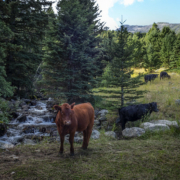Understanding Cattle’s Grazing Personalities Helps Match Management Objectives
Research from the University of California, Davis, published in the journal Applied Animal Behaviour Science, sheds light on better managing cattle grazing behavior. A two-year study of cattle fitted with GPS collars showed that some individuals had more grazing pattern variability, regardless of age or stage of pregnancy. Selecting these “nomadic” cattle, as indicated by their behavior during handling, could help land managers achieve their land use and management objectives with less labor and effort, say researchers. “Animal science tends to look overlook the mind of the animal when searching for solutions to challenges,” senior author Kristina Horback said. “It’s always been a direct line to genetics for immunity or nutrition, but nothing about the mind of the animal. And that’s such a loss. There’s so much we can learn from behavior in the end.”
Related ATTRA publication: Pasture, Rangeland, and Adaptive Grazing

 USDA Photo by Preston Keres
USDA Photo by Preston Keres
 Southern SARE
Southern SARE